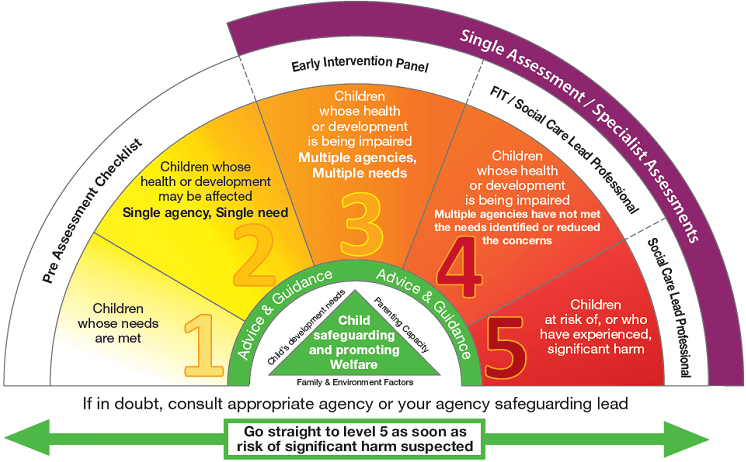Information and advice for parents and carers
The safety and welfare of children – also known as safeguarding – is everyone’s business. You could be a parent, relative, neighbour, friend, childminder, or you may work for any organisation which has contact with children and young people such as teacher or doctor.
Safeguarding means helping children to grow up into confident, healthy and happy adults. It also means protecting children from physical, emotional, sexual abuse and neglect. Most children generally enjoy a happy childhood experiences within their own family.
There is an Early Help Guidance and Advice team (accessible version) that sits alongside the Multi–Agency Screening Team (MAST). This service is Calderdale’s first point of contact for families and professionals, to enable them to access services to meet their needs.
More information for parents and carers:
This summarises the procedures that will be followed if Children’s Social Care receive a referral that a child may suffer or has suffered abuse.
Child ExploitationGain a better understanding of what child sexual exploitation is, learn how to spot the signs and who to report incidents too.
What is abuseChild abuse is any form of physical, emotional or sexual mistreatment or lack of care that leads to injury or harm.
Private fosteringPrivate fostering is very different from the care of children provided by local councils through approved foster carers. Find out what the difference is…
BullyingGet advice on issues regarding bullying
Missing childrenWhat to do when a child goes missing
Early Intervention & Safeguarding
Early Intervention
In Calderdale, services to children, young people and their families are provided on a ‘Continuum of Need’ (See below).
In other words, most children will access universal services such as, School, Dentist, GP as required throughout their life and will not have any additional needs. Children whose needs are met in this way by universal services are described as children at Level or Tier 1 of the Continuum of Need.
The diagram shows that when additional needs are identified or are unmet, additional services need to become involved and the response from the relevant agencies should be more coordinated. Most children with additional needs will be at Level 2, those that require a coordinated response may be referred to one of the Early Intervention panels (with parental consent) in order to identify the correct services to support members of the family and to nominate a Lead Professional to complete an Early Intervention Single Assessment. The Lead Professional may be someone the child or family is already working with, for example, Learning Mentor, Health Visitor, YOT worker, Youth Worker and the aim of the assessment is to better understand the child and young person’s needs. The family and professionals will produce a plan to help the family to deal with the difficulties they are experiencing. This will involve having regular multi-agency meetings to make sure that the plan is working. This is Level 3 of the Continuum of Need.
When the support of services has not been able to make a difference or if the child’s needs are very complex, Children’s Social Care may need to become involved to provide a more specialist type of support. ‘Children in Need’ are at Level 4 of the Continuum of Need.
Statutory intervention
Concerns about the abuse, exploitation or neglect of a child or young person, need to be referred to MAST (Children’s Social Care) so they can make enquiries to find out what is happening to the child and whether protective action is needed. Children who are involved with Children’s Social Care for these reasons, are said to be at Level 5 of the Continuum of Need.
Continuum of Need

Keeping Children Safe Online
UK Safer Internet Centre has produced Report Harmful Content. Each report button will guide you through the reporting process and offer appropriate advice. They aim to respond to your enquiry within 72 hours. If they can’t help resolve the matter, wherever possible they will explain why it is not possible to seek mediation (for example if the matter doesn’t breach a site’s terms) and will put you in touch with people who can provide wraparound support.
For more information about Keeping children safe online visit NSPCC
Skips Safety Net also has a range of free resources and tools
Keeping Children Safe in Sport
It’s important that you feel confident that sports and activities that your child is participating in are safe. The Child Protection in Sport Unit and Sport England both have some guidance around this.
The Safe to Play campaign has some resources to raise awareness of exploitation within sport that are aimed at parents and carers.
Learn more about keeping your child safe in sport by viewing this 30 minute webinar.
Keeping Our Children Safe - a film for Roma Parents
This short film, Keeping our children safe, looks at key elements of the legal framework of child protection in England. It is aimed specifically at Roma parents living in the UK and aims to address their needs. The film is narrated by Roma community members in Romanes.
Family Rights Group - Short Film
Family Rights Group’s new film was created with and for parents with learning difficulties and disabilities, on working with child and family social workers.
Made in partnership with advocacy organisation Speakup Rotherham, the film is a much-needed resource for parents and those working with them.
